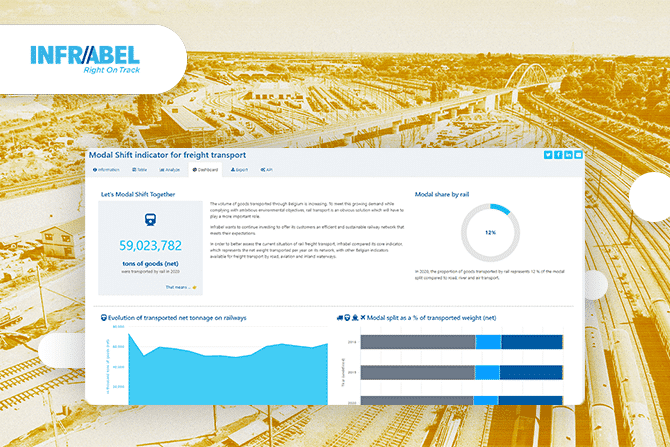The Infrabel Story: A New Approach to Data Sharing with Open Data

Let’s explore what happened when Infrabel started its open data portal. What impact did it have on the Belgian infrastructure management company’s employees?
Today, we’ve decided to put the spotlight on one of our Belgian clients: Infrabel, which manages the country’s railway network. Infrabel’s missions include upgrading and maintaining the network, as well as handling train traffic control.
Séverine Degueldre, the company’s Information Officer, kindly agreed to an interview with us and enthusiastically answered our questions. Séverine’s remarks will be of broad interest, coming just a few weeks after the mobility bill (LOM) was passed in France. Let’s get right into it!
Let’s start by introducing you to our readers. Could you tell us about your journey?
Hello! I studied library science, and it was in that context that I became aware of information technology (librarians’ work has changed a lot in recent years!). I went on to do a Master’s degree in Information and Communication Technology and Science, and my thesis topic was “Open Data in Library Catalogs.”
So it has been a real love story between you and open data!
It has! I was then hired by Infrabel, 6 years ago, as a documentalist in the company’s Documentation Center. My team manages the digital library, internal and external documentation, media monitoring, and now, for a little over a year, the open data project. We are gathering data from various sources, and then we’ll convert them into publishable datasets.
Did creating your portal bring about many changes in your department?
Yes, absolutely! We’ve gone from having a purely internal audience to a mixed audience. Our open data project drove us to look outward for the first time.
What do you like best about your work?
The fact that it’s so varied! I work with information from a wide variety of internal and external sources. I also enjoy facilitating access to information, helping people by giving them access to the data they need or making it possible for them to conduct their own research and be independent.
The mobility orientation law has just been passed in France. Does similar legislation exist in Belgium?
Yes, following the EU Directive on the reuse of public sector information, Belgium passed the Royal Decree of June 2, 2019, which deals with the reuse of data from public services. This regulation is part of a broader movement toward digitalizing and simplifying the Belgian civil service.
So you decided to start your data sharing process before the law was effective in your country?
Absolutely! We wanted to get a head start so that we could do things the right way. We had already posted some documents on our website, but we felt it was time to formalize our data sharing. It was important to us because travelers and the media had been asking for data, especially regarding punctuality, for a while.
Punctuality, a topic that truly engages the masses… How did you go about preparing to open up your data portal?
We started by gathering as much data as possible within the company so we could map out all the data we had at our disposal. That mapping process was a sort of open data wish list, and it’s still current, because we have plenty more datasets to publish in the future!
What audience were you envisioning as you set up the portal?
Since we didn’t know exactly who would be using our data, our goal was to reach the broadest possible audience, to make the platform usable by people with all levels of IT skills. We paired our datasets with very clear, accessible descriptions, which was a real challenge, since most of our data come from technical services.
Of course, the portal is also aimed at specialists and techies; that is where APIs, etc., come into play. When we opened the portal, we invited a wide variety of stakeholders to a Hackathon focusing on punctuality data. It was really interesting to talk with people who brought such a range of perspectives to an issue that affects everyone.
Do you get the feeling that this new data-sharing method has had an impact on Infrabel’s employees?
Yes, there has been a big change in data awareness internally. While some teams had been dealing with data for a long time, others have just taken an interest in the topic through our portal. Our coworkers have even given us feedback about data quality and are helping us improve the data.
Are there datasets that you find more engaging than others?
I love working on geolocation issues. That’s something I had never done before, and that Opendatasoft makes a lot easier. As of now, two of our datasets are available with visualization: level crossings and track segments.
What positive effects have you noticed since your data portal was opened?
First and foremost, it pushed us to focus on transparency. The portal has also allowed us to become Infrabel’s official contact point for data. My team increasingly works hand in hand with the Communications department, for example.
Our platform has also made it possible for us to establish a very constructive dialogue with the general public. We were concerned that our data would draw criticism, but that hasn’t been the case at all; we have a very healthy question-and-answer relationship with our interlocutors. They are happy to have the opportunity to talk with the people who produce the data, and their questions showcase what we do.
Another very positive aspect of our portal is that it allows a variety of stakeholders to research and find information on their own. In some ways, I think of an open data portal as a kind of self-service resource! This way, the questions we get are very clear, because they are informed by prior research.
Who are your interlocutors and how do they contact you?
We are getting more and more requests from employees at SNCB (National Railway Company of Belgium) as well as from start-ups, university researchers, members of the Open Knowledge network, and statistical institutes. They mostly contact us via e-mail, or sometimes through social media.
What are your upcoming projects?
We always have a lot of irons in the fire, including the publication of network safety data (train speed, observance of signals, etc.). Gradually, we’ll be studying increasingly specific topics. Open data is an extremely useful tool in dealing with complex issues.
I’m certain that other projects will come to fruition soon. The more data build up, the more we’re able to cross-reference and reconcile them. We’re learning a lot, and it’s wonderful!
In conclusion, the launch of Infrabel’s open data portal has made it possible to:
- Gather the company’s data on a single, intuitive platform that is accessible to everyone.
- Meet expectations about open data in response to Belgian law and requests from the general public.
- Showcase Séverine’s work, making her team central to data-related issues, both inside the company and in its external relations.
As Séverine put it, “Everyone ought to become educated about data. It’s a major trend in our society.” Those words of wisdom seem like the perfect message to wrap up this article. We’ll be back soon with new datadventures!

Data drives effective, well-functioning smart cities and helps build local ecosystems that bring together all stakeholders to meet the needs of the entire community. However, sharing data between stakeholders can be difficult - based on recent Gartner research we explain how urban data exchanges transform smart city data sharing.

Driven by the need to decarbonize, increase efficiency and meet changing customer needs, the transport and mobility sector is undergoing a rapid transformation. Data is at the heart of this, with data portals critical to building an effective, sustainable and customer-centric transport ecosystem.

Seamless mobility is at the heart of effective and popular cities. Sharing data across the mobility ecosystem increases transparency, collaboration and efficiency, enabling smart city mobility that benefits businesses, citizens, transport operators and city government.

